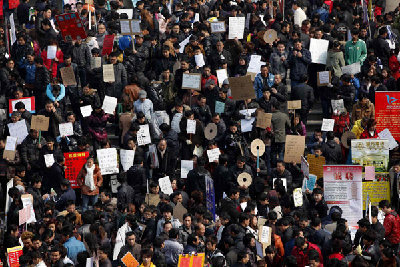PHOTO |
 China
World
Newsmaker
Slides
Weekly Photos
Share Your Photos
Special China
World
Newsmaker
Slides
Weekly Photos
Share Your Photos
Special
|
|
 |
Large Medium Small |
 |
|
Editor's Note: According to the National Bureau of Statistics, there are 150 million migrant workers in China. As China's economy continues to boom, the country's coastal provinces are facing a labor shortage after the Lunar New Year holidays, as the once seemingly endless flow of migrant workers seems to be dwindling. Many migrant workers who returned to their hometowns for the holidays decided to stay there for a variety of reasons, including the lower cost of living, new prospects closer to home and wanting to be with children they had not seen for months or even years. "The situation is extremely tough this year compared to previous years because only dozens of applicants handed in resumes for hundreds of vacant positions," said Li Huaying, owner of a Shanghai job agency who has been recruiting migrant workers for several years. Statistics by the transportation department in Shanghai last week revealed the number of migrant workers returning to the city from Sichuan and Anhui provinces fell by 10,000 a day from last year. In South China's Guangdong province, it will be short by about 1 million workers this year, according to the director of Guangdong's labor bureau. A survey released on Feb 11, 2011 shows 67 percent of companies in the eastern province of Jiangsu expect to have difficulty recruiting new workers this spring. So what is behind the labor shortage and what is new this year?? |
|
| |
| *?Bonds to left-behind children | |
|
Many migrant workers say not wanting to leave their children, who were left behind in their hometowns, is the major reason they decided not to go back to the cities, Guangzhou Daily reported on Feb 15, 2011. |
 A child talks over a phone with his migrant-worker parents while her peers cluster around in Lashu village,Shaoyang county, Hunan province,May 27,2010. [Photo/Xinhua] |
| * Urbanization of interior cities | |
|
The rapid urbanization and economic development of China's interior have also led to more opportunities closer to home for many former migrant workers. | |
| * Structural changes in China's demography | |
|
Zhang Yi at the Chinese Academy of Social Sciences' institute of population and labor economics attributes the labor shortage to structural changes in China's demography. The country's family planning policy, which has been running for 30 years, has resulted in decreasing numbers born in the 1980s and 1990s, which is problematic, he said, as young people make up a vast proportion of the migrant workers. "Increasingly, more young and fairly well-educated workers do not want to be in labor-intensive factories that pay low wages and produce low value goods," he said, adding they want decent jobs and have higher expectations. | |
| * China is undergoing an industrial transfer | |
|
Another reason for the shortage, said Zhang Yi, is?an industrial transfer, during which?the trend is for low-end manufacturing industries to move inland from China's eastern areas, causing a greater demand for workers there. | |
|
| |||
|
Migrant worker shortage a good phenomenon | |||
|
The battle for hiring migrant workers is a good phenomenon and symbolizes the start of workers' domination in the labor market, according to a commentary by Yu Fenghui for Xinhua News Agency. | |||
|
Ye Tan, a well-known economics commentator, also wrote on her blog that?it is a good sign that the severe working conditions the workers once had to bear are expected to change.
|
|
| ||||||||
| * Fierce battle for workers?? | ||||||||
 Recruiters hold up boards advertising jobs as they seek migrant workers at a job market in Yiwu, Zhejiang province. [Photo/Agencies] |
Coastal and inland cities are fiercely competing to attract migrant workers as China's labor shortage spreads to less-developed central and western regions. In Southwest China's Chongqing, many firms have set up booths at railway and bus stations to persuade workers to stay home instead of returning to the coast. The city's labor bureau on its website posted an open letter urging workers to find jobs close to home. Enterprises in coastal areas are not giving up, however. Firms in Shanghai have dispatched almost 400 buses to bring in workers from Anhui, Henan and Hubei provinces. Officials in Shaoxing, East China's Zhejiang province, reportedly contacted authorities in labor-rich Chongqing and Sichuan province for help in hiring more workers, only to be turned down. | |||||||
|
Creative methods to find workers | ||||||||
| ||||||||
|
| ||||||||
| * Shifting mindset of younger migrants | ||||||||
|
|
The "new generation of migrant workers", accounts for 61.6 percent of China’s migrant worker population, according to the National Bureau of Statistics. A report released by All-China Federation of Trade Unions defined the new generation as those born after 1980s and above 16 years of age, work in cities but still have a rural hukou (household registration). Traditional migrant workers have had experience of working in fields, which differs from the new generation who were brought up in cities by their migrant worker parents, or came to work right after graduating from middle school. | |||||||
| They value self-improvement as well as earning money. | They demand for better working conditions and social welfare. | They seek permanent migration to the city and social respect. |
|
"I hope I can learn something from the job and then go back to start my own career. For me, it is the priority to learn more. We shouldn't be short-sighted."
|
"They are generally more educated and thus more aware of their legal rights."
|
"Unlike the older generation who only work in the cities, more than 70 percent of the new generation of workers are willing to also live in the cities." "Compared with the first generation of migrant workers, the younger migrants had wider career choices because they were better educated. They depended less on the land and the trend was toward permanent migration to the cities."
|